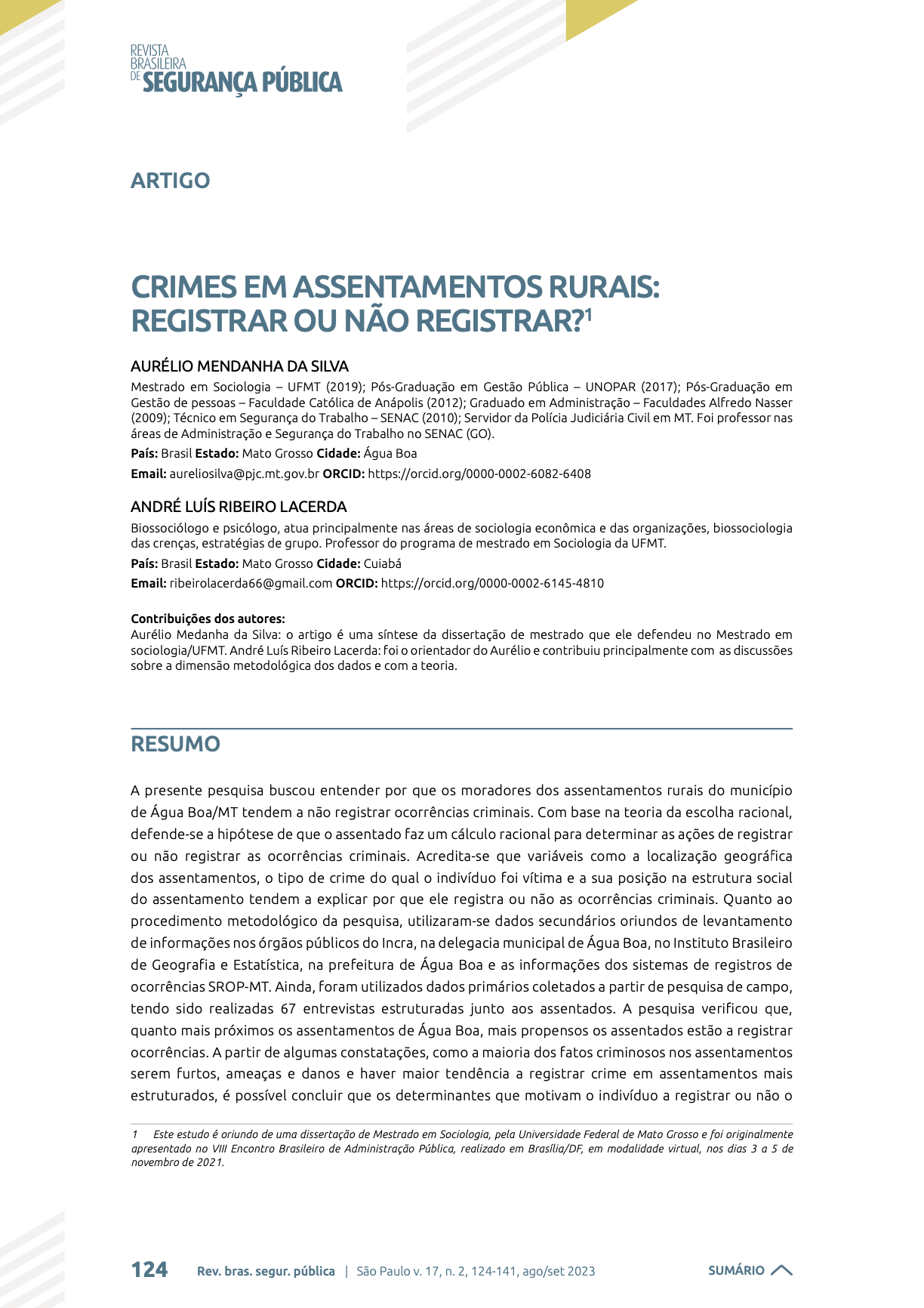Crimes in rural settlements
to register or not to register?
DOI:
https://doi.org/10.31060/rbsp.2023.v17.n2.1557Keywords:
Settled people, Rational choice, Police reports, CrimesAbstract
This study sought to understand why residents of rural settlements in the municipality of Água Boa/MT tend not to registrar police reports. Based on the theory of rational choice, we defend the hypothesis that the settlement individual makes a rational calculation to determine their actions of registering or not criminal occurrences, which includes variables such as the geographical location of the settlements, the type of crime of which the individual was a victim, and their social position in the settlement, as possible reasons of why these individuals register or not police reports. Regarding the methodological procedure, secondary data were used by collecting information in the public agencies of Incra, the municipal police station, the Brazilian Institute of Geography and Statistics, and The Municipality of Água Boa to analyze the documents and information of the systems of police reports. The primary data was acquired from field research with 67 structured interviews with the settlement individuals. The results showed that the closer the settlements were to Água Boa, the more individuals registered police reports. The findings pointed to most criminal facts in the settlements being thefts, threats, and property damage and that in more structured settlements, there is a greater tendency for individuals to register crimes. It is possible to conclude that the determinants that motivate the individual to register or not register crimes depend on personal assessments and the perception of the severity of the criminal or violent occurrence by calculating the cost and benefit of registering the police report.
Downloads
References
BEATO, C. (Coord.). Pesquisa Nacional de Vitimização. Ministério da Justiça; CRISP/UFMG; DATAFOLHA, dez. 2012.
BEATO FILHO, C.; PEIXOTO, B. T.; ANDRADE, M. V. Crime, oportunidade e vitimização. Revista Brasileira de Ciências Sociais, v. 19, n. 55, 2004, p. 73-89.
BECKER, G. S. Crime and punishment: An economic approach. In: FIELDING, N. S.; CLARKE, A.; WITT, R. The economic dimensions of crime. London: Palgrave Macmillan, 1968, p. 13-68.
BLACK, D. J. The Behavior of Law. New York: Academic Press, 1976.
BRASIL. Poder Executivo. Artigo 147 do Decreto-Lei Nº 2.848, de 7 de dezembro de 1940. Ameaçar alguém por palavra, escrito ou gesto, ou qualquer outro meio simbólico, de causar-lhe mal injusto ou grave: Pena – detenção, de um a seis meses, ou multa. Diário Oficial da União, Brasília/DF, Seção 1, p. 23911, 31 dez. 1940a.
BRASIL. Poder Executivo. Artigo 155 do Decreto-Lei Nº 2.848, de 7 de dezembro de 1940. Subtrair, para si ou para outrem, coisa alheia móvel: Pena – reclusão, de um a quatro anos, e multa. Diário Oficial da União, Brasília/DF, Seção 1, p. 23911, 31 dez. 1940b.
BRASIL. Poder Executivo. Decreto Nº 93.288, de 25 de setembro de 1986. Declara de interesse social, para fins de desapropriação, o imóvel rural denominado ¿Lote Jandira¿ (Gleba Serrinha), situado no Município de Água Boa, no Estado de Mato Grosso, compreendido na zona prioritária, para fins de reforma agrária, fixada pelo Decreto nº 92.620, de 2 de maio de 1986, e dá outras providências. Diário Oficial da União, Brasília/DF, Seção 1, p. 14565, 26 set. 1986a.
BRASIL. Poder Executivo. Decreto Nº 93.720, de 16 de dezembro de 1986. Declara de interesse social, para fins de desapropriação, o imóvel rural denominado "Gleba Jatobazinho - lotes Mangueirão e Triângulo", situado no Município de Água Boa, no Estado do Mato Grosso, compreendido na zona prioritária, para fins de reforma agrária, fixada pelo Decreto n° 92.620, de 2 de maio de 1986, e dá outras providências. Diário Oficial da União, Brasília/DF, Seção 1, p. 18924, 17 dez. 1986b.
BRASIL. Poder Executivo. Decreto Nº 94.106, de 18 de março de 1987. Declara de interesse social, para fins de desapropriação, o imóvel rural denominado “Gleba Serrinha – Lote Última Hora”, situado no Município de Água Boa, no Estado de Mato Grosso, compreendido na zona prioritária, para fins de reforma agrária, fixada pelo Decreto n° 92.620, de 2 de maio de 1986, classificado no Cadastro de Imóveis Rurais do INCRA como latifúndio por exploração, e dá outras providências. Diário Oficial da União, Brasília/DF, Seção 1, p. 3941, 19 mar. 1987.
COLEMAN, J. Social capital in the creation of human capital. American Journal of Sociology, v. 94, suppl. Organizations and Institutions: Sociological and Economic Approaches to the Analysis of Social Structure, p. S95-S120, 1988.
DIRK, R. C. Homicídio Doloso no Estado do Rio de Janeiro: uma análise sobre os registros de ocorrência da Polícia Civil. Dissertação (Mestrado em Estudos Populacionais e Pesquisa Social) – Escola Nacional de Ciências Estatísticas, Rio de Janeiro, 2007.
DURKHEIM, É. As regras do método sociológico. São Paulo: Martin Claret, 2002.
ELSTER, J. Peças e engrenagens das ciências sociais. Rio de Janeiro: RelumeDumará, 1994.
GOUDRIAAN, H.; LYNCH, J. P.; NIEUWBEERTA, P. Reporting to the police in western nations: A theoretical analysis of the effects of social context. Justice Quarterly, v. 21, n. 4, 2004, p. 933-969.
HECHTER, M.; KANAZAWA, S. Sociological rational choice theory. Annual Review ofSociology,v. 23, p. 191-214, 1997.
INSTITUTO NACIONAL DE COLONIZAÇÃO E REFORMA AGRÁRIA – INCRA. Relatório de Assentamentos, Informações Gerais, Superintendência Regional Mato Grosso – SR 13. Brasília/DF: Incra, Diretoria de Gestão Estratégica, Coordenação Geral de Monitoramento e Avaliação da Gestão, Data de atualização: 31 dez. 2017.
INSTITUTO BRASILEIRO DE GEOGRAFIA E ESTATÍSTICA – IBGE. Panorama – Água Boa, Mato Grosso, Brasil. IBGE, 2018.
INSTITUTO NACIONAL DE COLONIZAÇÃO E REFORMA AGRÁRIA – INCRA.
Reforma Agrária – A Política. Incra, Brasília/DF, 28 jan. 2020a.
INSTITUTO NACIONAL DE COLONIZAÇÃO E REFORMA AGRÁRIA – INCRA.
Reforma Agrária – Assentamentos. Incra, Brasília/DF, 28 jan. 2020b.
MALHOTRA, N. Pesquisa de marketing. 3 ed. Porto Alegre: Bookman, 2001.
MARTINS, J. S. Reforma agrária: o impossível diálogo. São Paulo: Edusp, 2004. 174p.
MATO GROSSO. Estado. Decreto Nº 462, de 22 de abril de 2020. Atualiza os critérios para aplicação de medidas não farmacológicas excepcionais, de caráter temporário, restritivas à circulação e às atividades privadas, para a prevenção dos riscos de disseminação do coronavírus em todo o território de Mato Grosso. Cuiabá/MT: Diário Oficial do Estado, 22 abr. 2020.
SÁ, A. A. Vitimização no sistema penitenciário. Revista do Conselho
Nacional de Política Criminal e Penitenciária, v. 1, n. 8, p.15-32, jul./dez. 1996.
SKOGAN, W. G. Citizen reporting of crimes: some national panel data. Criminology, v. 13, n. 4, p.535-549, 1976.
SKOGAN, W. G. Reporting crimes to the police: the status of world research. Journal of Research in Crime and Delinquency, v. 21, n. 2, p. 113-137, 1984.
SOUZA, J. L. C.; BRITO, D. C.; BARP, W. J. Subnotificação de violência e crimes na cidade de Belém. Anais do XV Congresso Brasileiro de Sociologia: Mudanças, Permanências e Desafios Sociológicos. GT (32): Violência e Sociedade. Curitiba/PR, jul. 2011.

Published
How to Cite
Issue
Section
License
Copyright (c) 2023 Revista Brasileira de Segurança Pública

This work is licensed under a Creative Commons Attribution 4.0 International License.
Licensing
The Brazilian Journal of Public Security uses the Creative Commons License as a form of licensing for its published works. The license used follows the CC BY 4.0 - Attribution 4.0 International model.
To see the permitted rights please go to the full licence or to our Copyright and Licensing page.


